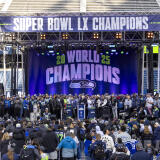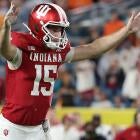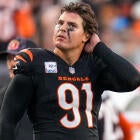Jay Cutler departs Chicago as Bears' most underappreciated, misunderstood QB ever
Cutler is the greatest quarterback in franchise history, but was unfairly demonized in his Bears career

It began with four interceptions in Green Bay in 2009. It ended with an interception in New Jersey in 2016.
In between, there was a God-given arm squeezing rockets into double coverage. There was an embarrassing offensive line allowing concussion-inducing sacks. There was an NFC North crown and a playoff win. There was a controversial injury and a devastating loss. There were perfectly weighted fades to Brandon Marshall and home-run bombs to Alshon Jeffery. There were 154 touchdown passes and 109 interceptions. There were 18 game-winning drives. There were Super Bowl aspirations and burning dumpsters.
The Jay Cutler era in Chicago is over. On Thursday, the Bears cut him. Cutler, 33, is no longer the quarterback of the Chicago Bears. The dream former Bears general manager Jerry Angelo had when he sent a king’s ransom -- including two first-round picks -- to Denver in April 2009 never materialized.
Cutler’s legacy, however, is more complicated than wins and losses. This won’t be an easy eulogy, because his career can’t be captured by his touchdowns and interceptions. What Cutler is leaving behind is the legacy of a quarterback who dedicated his heart and body to a city and sport that never loved him back, because they both failed to understand him.
Jay Cutler departs Chicago as the most underappreciated and misunderstood player -- arguably ever.
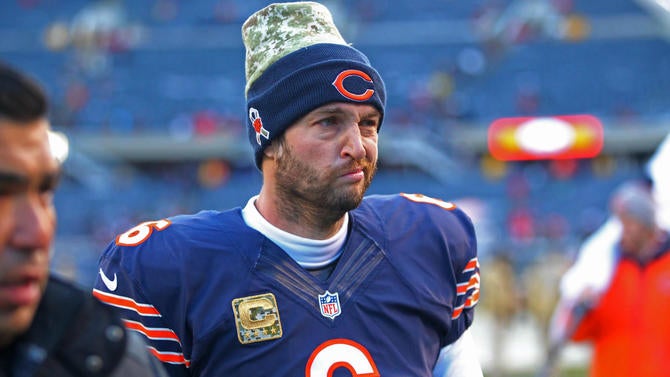
Every Bears fan undoubtedly remembers where they were when the Bears pulled the trigger, freeing Cutler from the tyranny of Josh McDaniels. He wasn’t just a 25-year-old, Pro Bowl quarterback who oozed potential. He was Chicago’s savior, a God in the form of an emo haircut, a smug smile and a rifle for an arm.
He never fit the part. In his first start -- against the Packers -- he threw four interceptions. Angelo was left staring “blankly at the field, glasses off,” as ESPN’s Jon Greenberg chronicled. Cutler led the league in interceptions.
But hope lingered into his second year, when he overcame the league’s worst offensive line, helping the Bears win the NFC North and reach the conference title game. The Super Bowl, the reason Cutler came to Chicago, was within reach. Only the hated Packers stood in his way.
What happened next has been documented to death: Cutler tore his medial collateral ligament and finished the game pedaling a stationary bike on the sidelines. The Bears lost. Fans burned his jersey. Former players and pundits sitting on comfortable couches in their cozy homes and studios claimed Cutler should’ve played through the injury, as if quarterbacks don’t need their knees.
Bad luck and disappointment followed. The next season, the Bears were in the midst of a five-game winning streak and pushed their record to 7-3. But Cutler broke his thumb trying to tackle a defender who only intercepted his pass when a receiver slipped on a slant. Cutler needed the Bears’ backup quarterbacks to go 3-3 to get the chance to shake his playoff narrative. They went 1-5 and missed the playoffs instead.
In 2012, the Bears won 10 games, but that wasn’t good enough to qualify for the postseason. In 2013, the Bears seemingly locked up the division despite their 30th-ranked defense, until Aaron Rodgers’ fourth-down miracle to Randall Cobb. In 2014, the ugliest season in recent Bears history, Cutler was turned into a scapegoat by a desperate-to-save-his-job Marc Trestman. In 2015, despite nobody really wanting him in Chicago, he experienced a career-best season on a rebuilding team. His 2016 season was ruined by injuries. His final pass -- a desperation heave -- was intercepted by the Giants. After the game, we learned that Cutler had torn a labrum in his throwing shoulder, which robbed him of an opportunity to save his job.
Just like that, his Bears career was over. It was a fitting ending -- the quarterback playing through an injury nobody knew about and coming up just short.
In the end, Cutler led the Bears to a 51-51 record (because of course he did). He’s the franchise’s all-time leader in passing yards and touchdowns. He brought stability to a team that didn’t know what that word meant. He’s the greatest quarterback in Bears history.
But it wasn’t enough. Before Cutler arrived in Chicago, the NFL had already determined that he was supposed to turn into one of the NFL’s best quarterbacks. Cutler, like most athletes, had no say in the matter. Anything less than what the league expected would be regarded as a failure.
In that sense, Cutler failed. He never became the quarterback we all thought he would. And we blamed him for that failure.
In 2012, Bill Barnwell wrote this for Grantland:
The dominant narrative surrounding Jay Cutler — to an extent unmatched by any player in the NFL — is that he needs to be fixed. That Jay Cutler is a few small changes away from being the quarterback we want him to be. That there are flaws so patently obvious and easy to fix that one new offensive coordinator or receiver or city will do it. Imagine if there were a Jay Cutler who didn’t throw four picks in one game! Or one who didn’t yell at his teammates when they screwed up! Or one who didn’t walk around with that smug look on his face all the time! We lash out at Jay Cutler after his bad games like we’re fighting with our significant others. If Jay Cutler would just put the dishes in the dishwasher instead of leaving them in the sink, we’d all have gone to the Super Bowl a long time ago.
Let’s turn this question on ourselves, though, because it’s going to tell us a lot about how we judge football players irrationally. Why does Jay Cutler have to get fixed? Why can’t he just be a pretty good quarterback who delivers one or two terrible games a year? Isn’t that good enough?
It has been four-and-a-half years since Barnwell wrote that and the answer is still a resounding no.
When ESPN reported on Feb. 21 that the Bears were actively shopping Cutler, which officially signaled the end of the era, the bashing began. Twitter joked about the interceptions Cutler was already throwing for his next team, even though Eli Manning, Drew Brees, Philip Rivers and Carson Palmer have been picked off more times since Cutler entered the league. Some pointed out that his backups were always better than him, even though his backups posted a 7-19 record. Who in their right mind, the internet mused, would want to trade for one of the worst quarterbacks of all time?
Those criticisms aren’t fair. Does Cutler throw too many interceptions? Of course. Does that make him a bad quarterback? Of course not. But to his critics, Cutler is the devil, because he never lived up to their -- not his -- expectations.
Toss aside those failed expectations for a moment, though, and look at what Cutler did for the Bears. He never turned into a savior, but he was a quarterback the Bears needed, someone they could trust to score just enough points and not get in the way of an elite defense. Cutler kept the Bears in close games with his toughness and athleticism, winning with his knack for engineering late-game comebacks.
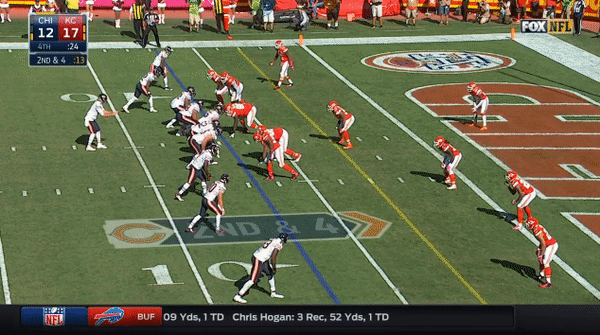
The stats never did him justice. What went down as ordinary completions for Cutler were impossible plays for most other quarterbacks. Cutler turned a broken offense into an actual NFL offense.
He was an imperfect, ungraceful escape artist:
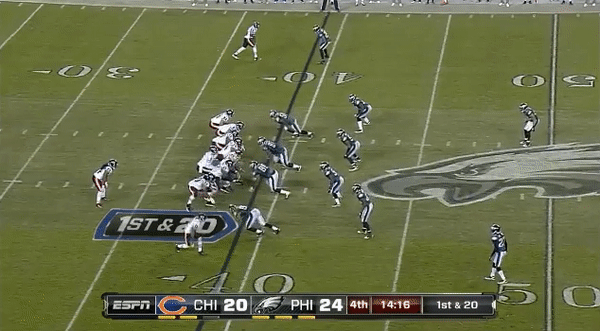
He rescued failed plays. He was arguably more effective when things didn’t go as planned.
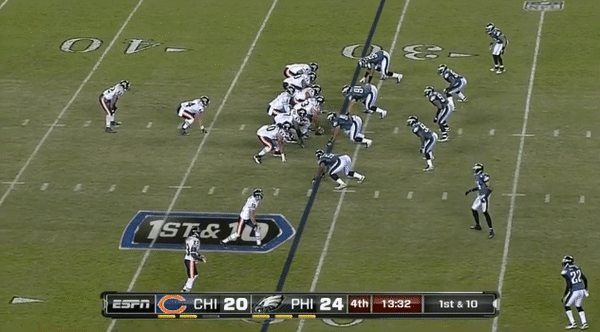
He chucked up jump balls because he trusted (sometimes to a fault) his teammates to win downfield.
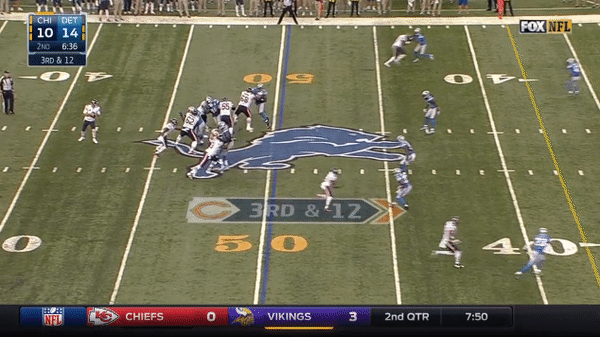
He made the kind of throws from crowded pockets that most quarterbacks wouldn’t dare try.
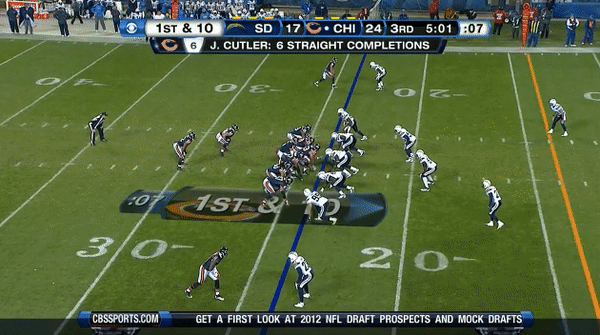
It never was easy. For much of his time in Chicago, Cutler targeted receivers who were primarily on the roster for special teams. Pundits who wonder why Cutler never mastered perfect throwing mechanics overlook that he always had pass rushers bearing down on him. He was sacked 2.46 times per game in his Bears career. Still, he never slid when he had the chance, choosing to sacrifice his health instead.
And he almost always got back up, even from hits like this:
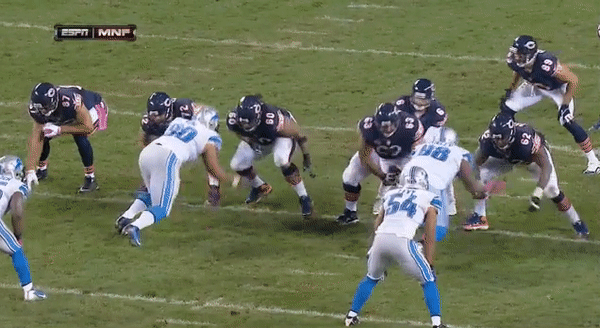
I’ve never appreciated a player like I appreciate Cutler, who repeatedly took a beating -- all for a city that refused to respect him.
Here’s what he accomplished: From 2010-12, when the Bears featured a playoff-worthy defense, he guided them to a 27-13 record while the team’s backup quarterbacks went 2-6. In that span, Cutler won the seventh-most games among all quarterbacks, despite the fact that he missed eight games. Not many quarterbacks could’ve won the amount of games Cutler did with that offensive line and that supporting cast (WR1: Devin Hester, WR2: Johnny Knox). Even Peyton Manning and Tom Brady, with their limited mobility, would’ve been doomed.
After that three-year window, Cutler’s problems began. He spent the next four seasons toiling away for mostly bad teams. He suffered serious injuries -- almost like all of those previous poundings added up on a human body. When Bears greats like Brian Urlacher, Charles Tillman and Lance Briggs aged, the defense collapsed. And Cutler wasn’t good enough to save the Bears by himself. But how many quarterbacks are? Outside of Brady, Rodgers, Manning (Peyton, not Eli) and Brees, there aren’t many.
That’s the truth about his talent level: You can win with Cutler, with that three-year stretch serving as proof. But you can’t win with only Cutler -- the past few seasons prove that much. He’s a good, not great, quarterback.
His perception never helped him. We’ve all seen his smug smirk, the Smokin’ Jay Cutler meme, and his aloof personality. That’s where Cutler is misunderstood.
Critics say he doesn’t care. That he’s not a leader. Fans hate him so much he was once named one of the league’s most unpopular players, right alongside someone who ran a dogfighting ring and someone who has been accused of sexual assault twice.
Reality says otherwise. The evidence says that when Cutler was a member of the Broncos, he was immature. It suggests he likely didn’t feel comfortable becoming a leader in a Chicago locker room that already featured prominent voices in Urlacher, Briggs and longtime center Olin Kreutz. But it also says that he grew as he aged. Cutler matured over time, at least to his teammates and those in the media who covered him. Unsurprisingly, that maturation occurred after marriage and fatherhood.
His teammates never shied away from defending Cutler. Robbie Gould once publicly called out the Bears’ coach to defend Cutler. This past season, Cutler was elected (by the players) to John Fox’s leadership council.
#Bears coach John Fox on QB Jay Cutler: "The perception in the building may be a little different than outside from what I've gathered."
— Zach Zaidman (@ZachZaidman) March 1, 2017
Look at what Kyle Long wrote Thursday:
In recent years, reporters who covered Cutler for a number of years talked about his growth off the field. When David Haugh of the Chicago Tribune sat down for an interview with Cutler in January 2016, he noted how much the circumstances changed:
In 2009, Cutler and I sat down for a similar one-on-one interview. Scratch that: We didn’t sit at all that day almost seven years ago; Cutler cavalierly stood with his back against the wall in a hallway at the Bears facility and tossed a plastic water bottle in the air between questions, avoiding eye contact at all costs.
In retrospect, that detached prima donna seems like a different guy than the one who now undergoes regular introspection.
In that interview, Cutler credited couples therapy for helping him mature. He admitted to mishandling the Denver trade debacle. He said if he could, he would go back and do it differently. He was thoughtful and reflective.
“We all become a little wiser,” Cutler told Haugh. “Now I take a little more time to process things. In Denver, when it went down and I [asked for a trade], it was more of a reaction instead of thinking about it and saying, ‘Do I really want to go through with this and pit myself versus [former Broncos coach] Josh [McDaniels] and Denver?’ If I was in that situation now, it might play out differently. But as you get older and having Kristin and the boys [Camden and Jaxon] and now a daughter [Saylor], there’s a lot more to think about. It’s not just you. Having kids helps you realize how selfish you can be as a person, rather quickly. These have all been things I haven’t mastered, but I’m definitely more aware of.”
From the beginning, he always was honest and blunt. In his early years, he said he had a stronger arm than John Elway (true). In January 2016, after a career season, he bragged about outlasting all of his detractors.
“Still here,” Cutler told Chicago Sun-Times. “Everybody’s kind of probably taken a shot to get rid of me. It hasn’t worked so far.”
Also true. Well, until now.
He did what he wanted. In the process, he was unintentionally entertaining.
Remember when he told offensive coordinator Mike Martz to “f-- off” on national television? Remember when he didn’t see the defense he wanted and let out an audible “G------it” at the line of scrimmage on national television? Remember when he showed up to training camp in a conversion van? Remember when offensive coordinator Mike Tice tried to talk to him during a game and a frustrated Cutler refused to acknowledge him, again on national television?
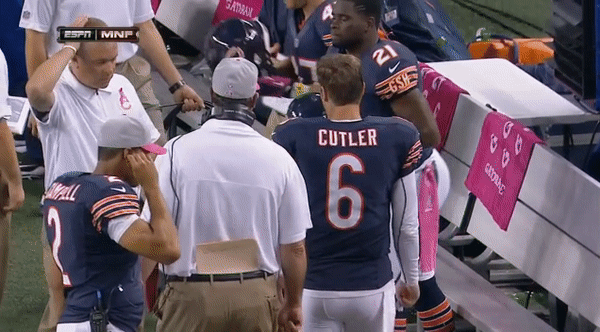
In a league that so often features bland, censored, PR-friendly athletes -- the Russell Wilsons, Tom Bradys and J.J. Watts -- Cutler is the opposite. He doesn’t give a damn about his public persona. He says and does whatever he wants in front of the microphone and cameras.
He didn’t seek out the spotlight or endorsements when he arrived in Chicago. He didn’t care about that. He was always true to himself, as Chris Jones wrote for ESPN:
It’s a mistake to think he doesn’t care about anything. I believe he cares so deeply about only a few things that his soul doesn’t have room for anything else. He loves football, throwing footballs in particular, and he apparently loves some tiny blond woman from TV and their baby boy. That nothing else catches hold in him -- including what any of us think -- is his gift, not his curse. We should all be so lucky to have such single-minded hearts.
He should’ve been beloved for that attitude. He was chastised instead, all because he doesn’t have a smile for TV.
He suffered the consequences for that single-minded heart of his, because we -- Chicago, fans, pundits -- wanted him to be better than us, both on and off the field. The cruel truth was that he was the same as all of us. He showed his frustration when his co-workers didn’t have his back. He argued with his bosses when he felt they weren’t putting him in a position to succeed. A friend of Grantland’s Robert Mays once noted, “There were those couple games where you could see him feeling like I do when I come to work, which is, ‘Screw it. This is not going to be fun, but I’ve got a job to do.’” He made mistakes.
Jay Cutler was no God. He was human. He was like you and me. But that was never good enough for us.
Cutler certainly isn’t faultless in this divorce. He never lived up to his potential -- that much is true. If the Bears had known he would be nothing more than a solid quarterback, they never would’ve mortgaged their future for him. But the Bears also deserve blame. They bought a Ferrari and refused for so many years to maintain it. It’s not Cutler’s fault they traded Greg Olsen, drafted Shea McClellin, Kyle Fuller and Gabe Carimi in the first round and hired Marc Trestman over Bruce Arians. Playing the blame game is pointless, because there’s plenty to throw around.
It’s also pointless to say the Bears are making a mistake in severing their relationship with him. Can the Bears win with Cutler? Yes. Is he still a capable player who can thrive in the right environment? Yes. Is it time for the Bears to move on to a younger option? Probably. The Bears are still rebuilding, and by the time they’re ready to compete for a championship, Cutler’s window will likely be closed.
And so, we’ve arrived at the end. The Bears are once again searching for their savior. Maybe it’s Mike Glennon. Maybe they’ll find him in the draft. Maybe they’ll engineer yet another trade for a quarterback with promise whose future is nothing but bright. Regardless of the method, it probably won’t matter. The most likely scenario sees the Bears endlessly stumbling in the dark as they search for a Mr. Perfect who might not even exist.
Only then will the Bears realize how good they had it with Cutler. Only then will they appreciate Cutler for the quarterback he was: The hero Chicago deserved, but not the one it needs right now.





